第二讲 unit 1B
人教版九年级下册英语Unit1 SectionB(2a-2e)课件

• Share the learning habit you like best.
Post-reading
2d Look up the following words from the passage
认真完成作业
by
finding a pen pal taking part in English classes
找个笔友 上英语课
keeping a dairy in English
用英语写日记
reading English magazines
读英语杂志
getting an English tutor(家教)
熟能生巧。
Yes, I agree. 4. Do good learners learn from mistakes, or are they afraid of making mistakes? They learn from mistakes.
5. What study skills does the writer talk about? Do you have those study skills? 学习技能 Taking notes by writing down key words or by drawing mind maps, looking for ways to review what they have learned, and doing this by reading their notes every day or by explaining the information to another student.
九年级英语上册《Unit 2 Saving the Earth》Topic1 SectionB 教案 仁爱版
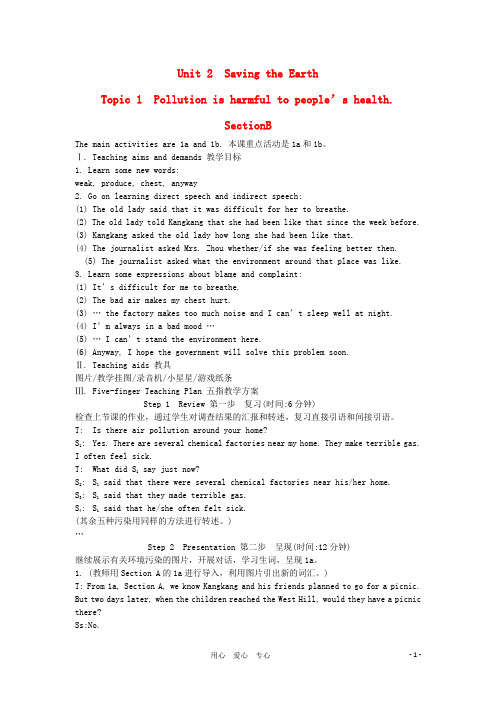
Unit 2 Saving the EarthTopic 1 Pollution is harmful to people’s health.SectionBThe main activities are 1a and 1b. 本课重点活动是1a和1b。
Ⅰ. Teaching aims and demands 教学目标1. Learn some new words:weak, produce, chest, anyway2. Go on learning direct speech and indirect speech:(1) The old lady said that it was difficult for her to breathe.(2) The old lady told Kangkang that she had been like that since the week before.(3) Kangkang asked the old lady how long she had been like that.(4) The journalist asked Mrs. Zhou whether/if she was feeling better then.(5) The journalist asked what the environment around that place was like.3. Learn some expressions about blame and complaint:(1) It’s difficult for me to breathe.(2) The bad air makes my chest hurt.(3) … the factory makes too much noise and I can’t sleep well at night.(4) I’m always in a bad mood …(5) … I can’t stand the environment here.(6) Anyway, I hope the government will solve this problem soon.Ⅱ. Teaching aids 教具图片/教学挂图/录音机/小星星/游戏纸条Ⅲ. Five-finger Teaching Plan 五指教学方案Step 1 Review 第一步复习(时间:6分钟)检查上节课的作业,通过学生对调查结果的汇报和转述,复习直接引语和间接引语。
2019-2020学年新外研版高中英语课堂总结课件:必修2 UNIT 1 Section B
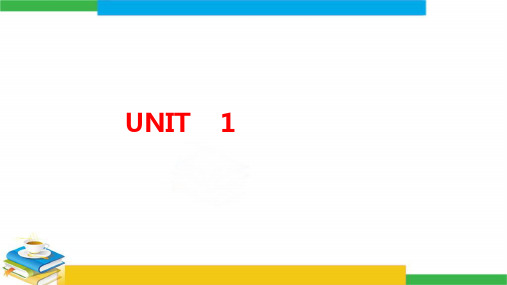
词汇五 investigate v. 查明,调查 【教材原句】 Investigate questions like these at our club. 在我们俱乐部研究这样的问题。 【要点必记】 investigate sb.(for sth.)(因为某事)调查某人
单句语法填空
(增加体重)quickglya.in
from
gain weight
词汇九 apply v. 请求,申请;使用,应用;有关,涉及 【教材原句】
After-school activities also play a part when students apply to college. 学生申请大学时,课外活动也起到一定的作用。 【要点必记】 (1)apply(to sb.)for sth.(向某人)申请某物
一句多译 这个学校为学生提供各种各样的课程。 (4) Students are offered __v_a_r_io_u_s____/ ____a_____ __v_a_r_ie_t_y__ ____o_f____ /__v_a_r_i_et_i_es_ ____o_f____ courses in this school.
mathematical problem.
(3) They are __h_i_g_h_l_y__ _in_t_e_ll_i_g_e_n_t _s_t_u_d_e_n_ts__(非常聪明的学生). (4) Susan’s a woman ____o_f____ ___h_ig_h____in__te_l_li_g_e_n_c_e(具有高智商的)we
(3)[词汇复现]Scientists _____________________________________________
仁爱版九年级英语上册Unit2Topic1SectionB教案

仁爱版九年级英语上册Unit2Topic1SectionB教案Unit 2 Saving the EarthTopic 1 Section B教案教学目标1.知识与能力目标Words and phrases: pain, produce, awful, bear, harmful, chest, editor, breathe/breath, soil get a pain in…, what’s worse, too much noise, too many problems, breathing problem, be harmful to, make a mess of, throw…aroundSentences: It’s difficult for me to breathe./ I’ve got a pain in my throat./ It’s really awful.A: How long have you been like this? A: Have you seen a doctor?B: I’ve been like this since la st week. B: Not yet.Grammar: Present Perfect (past participle和疑问句的问答).2.过程与方法通过谈论环境问题,让学生了解不同种类的污染及其危害。
3.情感态度与价值观引导学生关注环境问题,树立绿色环保意识,增强忧患意识和社会责任感。
教学重点1. some new words and useful phrases; the present perfect tense2. the present perfect tense教学过程Step 1 Review1. go over the phrases in section A2. Guide the Ss to discuss different kinds of pollution ingroups and share the answer together. Step 2 Presentation1. Watch the flash, then answer the questions below.1) Does Bruce look well?2) What’s wrong with him?3) How long has he been like this?4) Has he seen a doctor?2. Show a picture of the polluted West Hill, let the Ss listen to 1a once and tick the questions they hear in part A of 1b. Then check the answers together.A. Listen to 1a and check the questions you hear.1) What’s wrong with you?2) How long have you been like this?3) Where have you been?4) Have you seen a doctor?5) Have you noticed the dead fish in the river?B. Listen again and match each question above with an answer below.3. Read 1a and answer the questions.1) What caused Mrs. Zhou’s problems?2) What will Kangkang do?Step 3 Consolidation1.分角色朗读2a,选择四组进行比赛,激发学生朗读兴趣。
Unit 1 Topic 2 Section B课文讲解课件仁爱版英语七年级上册
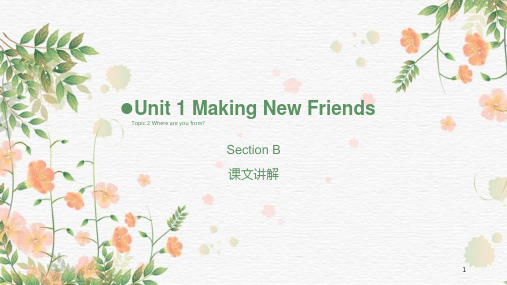
Deng Yaping
知识拓展
Stephen Hawking
family name
given name
姓
名
邓亚萍
given name
family name
名
姓
史蒂芬·霍金
15
Bye-bye
16
Unit 1 Making New Friends
Topic 2 Where are you from?
Section B 课文讲解
1
2
原文呈现
3
• look v. 看;看起来
重点精讲
Look! Who is she?
意为 “看”
Look! This is a cat.
意为 “看起来” You look happy.
Where is she from?
12
练一练
A: Look! _W__h_o_i_s_s_h_e__? B: She is Deng Yaping. A: Where is she from? B: __S_h_e_i_s_f_r_o_m__C_h_i_n_a____.
13
练一练
A: Look at the picture. Is he Stephen __. A: _W__h_e_r_e_i_s_h_e_f_r_o_m___? B: He is from England.
后接形容词
4
重点精讲
Look! Who is she?
注意
look用作不及物动词,后接宾 语,表示“看……”时要使用
look at。
e.g. 看这个女孩。
Look at this girl.
5
重点精讲
Unit 1 Section B(1a-1d)课件人教版2024新教材七年级上册英语

play tennis big family
She is 14 years old. She is from Singapore. She has a pet bird. I like to play tennis.
1d Compare yourself with either Pauline or Peter.
1. What can you see in the pictures?
A guitar, the big ben in the UK and Beijing roast duck.
2. Where are pictures?
They are on a board.
3. What are the pictures used for?
each other 彼此
Prediction(预测) Look at the picture and answer these questions.
1. What can you see in the pictures?
A parrot, Merlion in Singpore and a badmiton.
Review
按要求写出正确的单词、词组或句子。
1. 在同一个班级 (短语)in__t_h_e_s_a_me class 2. 班主任 (短语) _c_l_a_ss__te_acher
九年级英语全册 --Unit 1 Section B 第二课时

succeeded by trying many times and learning from his mistakes.
Developing their study skills It is not enough to just study hard. Good learners know the best way they can study. For example, they may take notes by writing down key words or by drawing mind maps. They also look for ways to review what they have learned. They may do this by reading their notes every day or by explaining the information to another student.
Everyone is born with the ability to learn. But whether or not you can do this well depends on your learning habits. Research shows that successful learners have some good habits in common.
2c Read the passage again and answer the questions.
1. Does the writer think that everyone is born with the ability to learn well? Do you agree? Why or why not?
人教版八年级英语上册教学课件:Unit1 B (2a-2e)

12
2c Read Jane’s diary entries again. Fill in the chart.
20
2. try v.& n. 尝试;设法;努力 I’ll try to improve. (用作动词) 我要设法改进。 Come
21
try to do sth. & try doing sth.
两者含义不同 前者:“试图或努力去做某事”, 后者:“尝试/试验一下某种方法”。 e.g. try to climb the mountain
17
2e Imagine Jane went to Penang Hill again and had a great day. Fill in the blanks in her diary entry with the correct forms of the verbs in brackets.
My _fa_t_h_e_r_ and I went to Penang Hill, but the weather __w_a_s__ really bad and rainy. We _w__a_it_e_d_ a long time for the train and we were __w__e_t__ and cold because we forgot to bring an _u_m_b__re_l_la_. Anna: Oh, no! Jane: And that’s not all! We also didn’t bring _e_n_o_u_g_h_ money, so we only had one bowl of rice and some fish.
Unit1SectionB—Unit2GrammarFocus教案
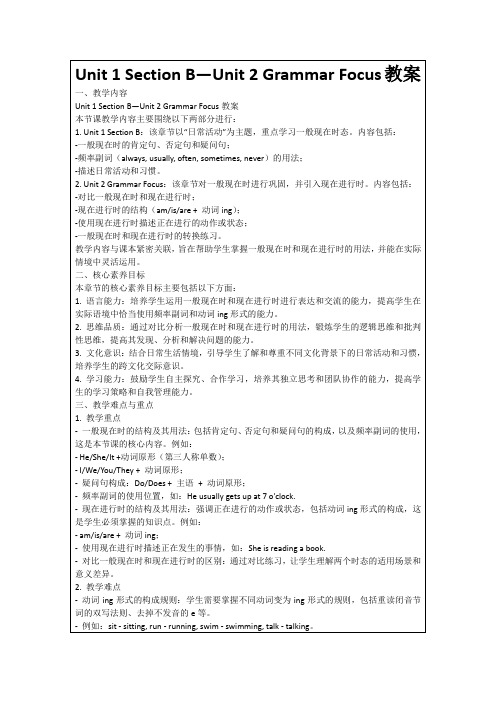
3.多设计一些有趣的活动,提高全体学生的参与度;
4.鼓励学生独立思考,培养他们的创新意识。
五、教学反思
在今天的教学过程中,我发现学生们对一般现在时和现在进行时的理解有了明显的提高。他们在小组讨论和实践活动中的表现给我留下了深刻的印象。然而,我也注意到一些需要改进的地方。
在导入新课的环节,通过提出与学生们日常生活密切相关的问题,成功引起了他们对本节课的兴趣。大多数学生能够积极参与讨论,分享自己的经历。但我也意识到,对于一些基础较弱的学生,可能需要更多的时间来消化和吸收新知识。
-使用现在进行时描述正在进行的动作或状态;
-一般现在时和现在进行时的转换练习。
教学内容与课本紧密关联,旨在帮助学生掌握一般现在时和现在进行时的用法,并能在实际情境中灵活运用。
二、核心素养目标
本章节的核心素养目标主要包括以下方面:
1.语言能力:培养学生运用一般现在时和现在进行时进行表达和交流的能力,提高学生在实际语境中恰当使用频率副词和动词ing形式的能力。
在学生小组讨论环节,我尽量以引导者的身份参与其中,让学生们自主思考、交流。从成果分享来看,学生们对于一般现在时和现在进行时的应用有了更深刻的认识。但我也注意到,有些学生在讨论时过于依赖课本,缺乏创新思维。为了培养学生的独立思考能力,我计划在今后的教学中,多设计一些开放性的问题,激发学生的创新意识。
1.加强对基础薄弱学生的辅导,确保他们能够跟上教学进度;
2.教学难点
-动词ing形式的构成规则:学生需要掌握不同动词变为ing形式的规则,包括重读闭音节词的双写法则、去掉不发音的e等。
-例如:sit - sitting, run - running, swim - swimming, talk - talking。
英语综合教程2(高职高专英语专业适用)Unit 1课件(text B)
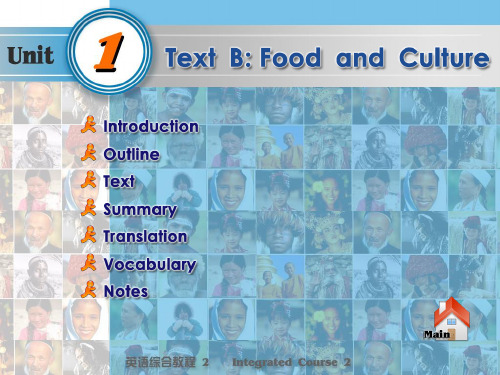
Para 5
Another example is that Americans do not eat dogs, although people from some other cultures regard them as good food. In the United States, dogs are very important to people as pets. They are usually regarded as part of the family, almost like a child in some cases. In addition, dogs have value as protection against criminals. Thieves will not usually enter a house where there is a dog because the dog will bark and possibly attack a stranger who is trying to get into a house. Apparently, the dog’s place in society as a companion and as a protection against criminals makes the dog taboo as food.
Para 7
Anthropologists believe that most food likes and dislikes are a result of the ways of life of different people. Some people live in areas where there are both large animals and many insects. It is difficult for these people to kill large animals, and it requires a lot of energy. It is easier for them to use insects for food because it is not difficult to catch insects and it does not require a lot of energy. Nomadic people who move around will not want to keep pigs for food. People will not eat pets such as dogs. Americans eat a lot of beef because there is plenty of land for raising cattle and their meat can be shipped cheaply for long distances by railroads.
unit2topic1sectionB

Unit 2 Looking DifferentTopic 1 I have a small nose.Section BClass: Class Four, Grade Seven Teacher: Liu Kun The main activities are 1a and 3.Ⅰ. Teaching aims and demands:1. Learn some useful words:favorite, actor, Chinese, does, look, arm, hand, leg, foot, short2. Continue to learn the description of people's appearances:(1)His hair is not long.(2)He has a big nose.(3)He has a wide mouth.(4)My face is round.3. Continue to learn the simple present tense with have/has:(1)-Does he have a wide mouth?-Yes, he does.(2)-Does he have long hair?-No, he doesn't.Ⅱ. Teaching aidstape recorder, some picturesⅢ. 可渗透的法制知识:《中华人民共和国民法通则》第一百条公民享有肖像权,未经本人同意,不得以营利为目的使用公民的肖像。
Ⅳ.Five-finger Teaching PlanStep 1 Review1. Warming up. Ask students to play a game: Bobby Says.The rule of the game: Invite four students to come to the blackboard, when the teacher says, Bobby says,” Touch your head.” the four students touch their heads. Do like this. The quickest student is the winner.2. Review the name of the body learnt in Section A.(1)Ask the students to write down the name of each part. And then the teacherleads in the new words: arm, hand, leg, foot. (Pay attention to the plural form of foot: feet.) Finish 3.(2)The teacher orders the students to touch their bodies to consolidate the newwords.T: Touch your arm.Touch your hand.Touch your leg.Touch your foot.3. Review and lead in the new sentence patterns.(1)First reviewT: Do you have a small mouth?S1: Yes, I do.T: Do you have long hair?S2: No, I don’t.(2)Ask the third student:T: Does he have a small mouth?S3: Yes, he does. ( The teacher help the student to answer.)T: Does she have long hair?S3: No, she doesn’t.(3) The teacher shows a picture and ask the students:T: Look at the doll. Does she have long hair?Ss: Yes, she does.T: Does she have small eyes?Ss: No, she doesn't.(4) After the teacher takes some examples by some pictures, ask students to practice the sentence patterns with their partners.S1: Does she have big ears?S2: No, she doesn't.S3: Does she have a small mouth?S4: Yes, she does....Step 2 Presentation1. The teacher shows a photo of Zhao Wei and describes her appearance.T: Look at this picture. Who is she?Ss: She is Zhao Wei.T: Does she have big eyes?Ss: Yes, she does.T: Does she have a wide mouth?Ss: No, she doesn’t.T: She is my favorite actress. (write down favorite, actress on the blackboard.) Do you want to know who Michael’s favorite actor is? (write down actor on the blackboard. Lead to the new lesson in 1a.)2. The teacher shows a photo of Cheng Long and asks the students to observe his appearance.T: Look at the picture and answer my questions. Does he have long hair?S1: No, he doesn't.T: Does he have a wide mouth?S2: Yes, he does.T:Now please tell me who Michael’s favorite actor is.Ss: Cheng Long.T: Good. His English name is Jackie Chan. Let’s listen to 1a and answer the following questions:(1)Who is he?(2)Who is Michael’s favorite actor?3. Ask students to listen to the tape again and try to understand the dialog.4. Read after the teacher.5. Listen again and repeat. Pay attention to your pronunciation and intonation. Step 3 Consolidation1. Read the dialog together and ask students to finish 1b.2. Ask students to act the dialog out.3. Make a similar conversation according to 1a, and act it out.For example:S1: I have a good friend in your class. Guess who it is.S2: Is your friend a girl?S1: Yes, she is. She has a big nose.S2: Does she have long hair?S1: Yes, she does.S2: Does she have small eyes?S1: No, she doesn't. Her eyes are big.S1: Is she Peng Liqun?S2: Yes, you are right.Step 4 Practice1.Ask students to listen to 1 and choose who is Mr. Wang.2. Listen again and learn how to judge who is Mr. Wang.3. Chain drills. Ask students practice the following sentence patterns one by one. For example:S1: Do you have big eyes?S2: Yes, I do.S3: Does he/she have big eyes?S4: Yes, he/she does.S5: Do you have a wide mouth?S6: No, I don’t.S7: Does he/she have a wide mouth?S8: No, he/she doesn’t.…Step 5 Project1. Play a guessing game.This game is asking a partner to guess who my good friend is. Allow the partnerto ask three questions about appearance. And then judge who my good friend is. T: OK. Let's begin.S1: I have a good friend in our class. He is a boy. Guess! Who?S2: Does he have a big head?S1: Yes, he does.S2: Does he have small eyes?S1: No, he doesn't.S2: Does he have a round face?S1: Yes, he does.S2: He is Yang Xing.S1: Yes, you're right. Great!If the answer is No, tell the answer. And continue to play the guessing game.2. Homework:①Practice 1a with your partner.②Review the words in Section A and Section B.③Make a similar dialog according to 1a.。
Unit1SectionB教案
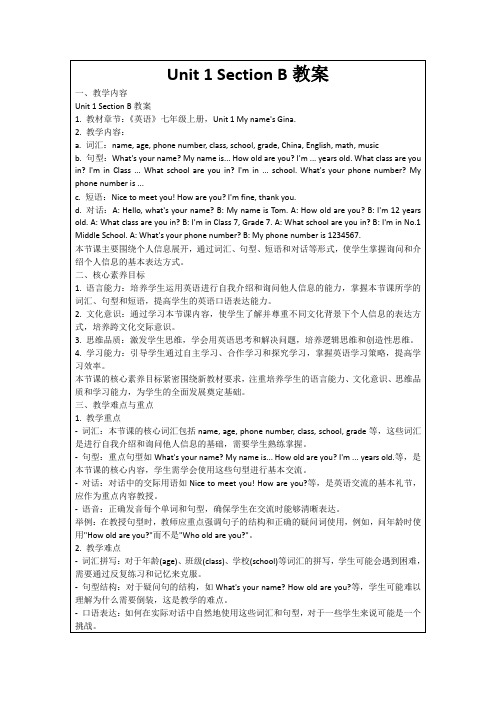
-文化差异:理解在不同文化背景下,询问个人信息的方式可能不同,例如,在一些文化中询问年龄可能是不礼貌的。
举例:在教授词汇拼写时,教师可以通过单词游戏、拼写竞赛等方式帮助学生记忆。对于句型结构,教师可以通过图解疑问句的结构,或者通过对比陈述句和疑问句的差异来帮助学生理解。在口语表达方面,教师可以组织角色扮演活动,让学生在实际情境中练习使用词汇和句型。至于文化差异,教师可以通过展示不同国家的交际习惯,让学生了解并尊重这些差异。
2.教学难点
-词汇拼写:对于年龄(age)、班级(class)、学校(school)等词汇的拼写,学生可能会遇到困难,需要通过反复练习和记忆来克服。
-句型结构:对于疑问句的结构,如What's your name? How old are you?等,学生可能难以理解为什么需要倒装,这是教学的难点。
五、教学反思
今天的课堂,我们学习了《Unit 1 Section B》这一章节,通过自我介绍和询问他人信息的内容,让学生们掌握了基本的英语交流技巧。在课后,我对整个教学过程进行了反思,有以下几点感悟:
课堂上,我注意到学生们对于新词汇和句型的学习积极性很高,他们愿意开口说英语,尝试用所学内容进行自我介绍和询问他人信息。这说明教学内容与学生的生活实际紧密相关,能够激发他们的学习兴趣。
2.实验操作:为了加深理解,我们将进行角色扮演活动。这个活动将演示如何在实际对话中使用这些词汇和句型。
3.成果展示:每个小组将向全班展示他们的讨论成果和角色扮演的结果。
(四)学生小组讨论(用时10分钟)
1.讨论主题:学生将围绕“如何在实际生活中用英语进行自我介绍和询问他人信息”这一主题展开讨论。他们将被鼓励提出自己的观点和想法,并与其他小组成员进行交流。
柳埠中学八下课件Unit1B2

after还可以用来表示在某一具体时间点或某 一具体事件以后,谓语动词可以用过去时, 也可以用将来时。如: He started after three days. 他三天后出发了。 They came back after ten o’clock. 他们是十点以后回来的。 We will go there after lunch. 午饭后我们将去那里。
Байду номын сангаас
3b On a piece of paper, write about your life in ten years. Don’t write your name on the paper. Put all the students’ papers together. Take turns reading the papers. Then guess who wrote them.
4. keep + doing
继续做, 继续做,坚持做
He kept running after her, trying to catch her. 他不停地在追赶她,试图抓到她。 他不停地在追赶她,试图抓到她。
put on;wear;dress;dress up ; ; ; 【Explanation】 put on强调“穿(戴)上” 的动作,它的宾语是衣服、鞋、帽等名词。 put on是终止性动词词组,所以不可以用来表 示穿(戴)多久了。如: He put on his coat and went out. 他穿上外套,出去了。
A: This paper says “I’ll be an engineer in ten years.” B: I think Lin Wei wrote that. C: Yes, I wrote it.
大学英语综合教程第二版2Unit1TextB

6. The high rate of interest is not the only attractive feature of the Bank of Dave . Equally important from the kids’ point of view is that their accounts belong to them . When they save ,they harvest the benefit ;when they want to spend ,they don’t need permission . Children who have no control over their own funds have no incentive not to beg for money and then spend every dollar that comes into theilp children become rational consumers is to give them more control , not less . Before we go on vocation , I’ll usually give my kids an extra twenty bucks or so , which I deposit in their accounts . I tell them that they can spend the extra money on a T-shirt , save it , spend it before we leave , or do anything else they want with it——but that while we are on vocation , they won’t receive any additional pocket money from me (except in the form of communal purchases considered by custom to be vacation entitlements , such as candy , ice cream , movie tickets , and so on . )
人教PEP版五年级英语上册《Unit 1 Part B 第二课时》教学课件优秀公开课

helpful
Play a game “I am fast”.
hard-1working
sh2y
he3lpful
po4lite
cle5ver
Game: What’s missing?
sh y
polite
helpful
hard-working
Summary
1. 学习了下列词汇: polite, hard-working, helpful,
七彩课堂 clever, shy。 伴你成长 2. 学习了询问和描述身边人物性格特征的句型:
—What’s … like? —She’s/He’s ...
Homework
one
two
七 彩课堂 ቤተ መጻሕፍቲ ባይዱ记本节课 所学
She often helps old people. She is …
She is afraid of talking with other people. She is …
They always say “Thank you “ “please” “excuse me” to other people. They are …
clever
Match and say
What’s he like?
He’s polite.
He is polite. She is shy. They are helpful. They are hard-working.
Practice in pairs.
What’s she like? She’s …
Let’s learn
Try to read.
- 1、下载文档前请自行甄别文档内容的完整性,平台不提供额外的编辑、内容补充、找答案等附加服务。
- 2、"仅部分预览"的文档,不可在线预览部分如存在完整性等问题,可反馈申请退款(可完整预览的文档不适用该条件!)。
- 3、如文档侵犯您的权益,请联系客服反馈,我们会尽快为您处理(人工客服工作时间:9:00-18:30)。
第一讲How can we become good learners?Section B【重点单词】1. pronounce [prəˈnauns] v. 发音2. increase [inˈkri:s] v. 增加;增长3. speed [spi:d] n. 速度4. partner [ˈpɑ:tnə] n.搭档;同伴5. born [bɔ:n] v. 出生; adj. 天生的be born with 天生具有6. ability [əˈbiliti] n. 能力,才能7. create [kriˈeit] v. 创造,创建8. brain [brein] n. 大脑9. active [ˈæktiv] adj. 积极的;活跃的10. attention [əˈtenʃən] n. 注意;关注pay attention to 注意;关注11. connect [kəˈnekt] v. (使)连接;与…有联系connect...with 把......和......连接或联系起来12. overnight [ˌəuvəˈnait] adv. 一夜之间;在夜间13. review [riˈvju:] v.& n. 回顾;复习14. knowledge [ˈnɔlidʒ] n. 知识;学问15. lifelong ['laiflɔŋ] adj. 终身的;毕生的16. wisely [waizli] adv. 明智地;聪明地Annie [ˈæni] 安妮(女名)Alexander 亚历山大.格雷厄姆.贝尔【重点短语】1.not always 不一定总是2.increase to... 增加到......3.increase by... 增加了......4.speed of... 以......的速度5.make mistakes=make a mistake 犯错,出错6.get...right 使......正确,纠正7.be born with 天生俱有8.depend on 视......而定,依靠,依赖9.be interested in=take an interest in 对......感兴趣10.take an active part in 积极参加......11.pay attention to 注意,关注12.connect... with... 把...和...连接或联系在一起13.be connected with 与......有关系14.get bored 感到厌烦,无聊15.think about 考虑16.think over 仔细考虑17.think of 想起18.be good at=do well in 在......方面擅长/做得好19.be good for 对......有益20.be good to 对......和蔼/友善21.even if=even though 即使22.keep doing sth. 一直做某事23.keep sb.doing sth. 让某人一直做某事24.be afraid of 害怕......25.on one’s own 独自,单独,独立地26.of one’s own 属于某人自己的27.with one’s own 用某人自己的28.instead of 代替,而不是【重点句型】1.I can't always understand spoken English. 我并非总是能听懂英语口语。
2.I don’t know how to increase my reading speed. 我不知道如何提高我的阅读速度。
3.I often make mistakes in grammar. 我经常在语法方面犯错误。
4.He can’t get the pronunciation right. 他不能使发音正确。
5.I don’t have a partner to practice English with. 我没有一起练习英语的伙伴。
6.Everyone is born with the ability to learn. 每个人天生都具有学习的能力。
7.But whether or not you can do this well depends on your learning habits.但是你是否能把这做好取决于你的学习习惯。
8.Creating an interest in what they learn. 激发他们对所学内容的兴趣。
9.Studies show that if you are interested in something, your brain is more active and it is also easier for you to pay attention to it for a long time.研究表明,如果你对某事感兴趣,你的大脑就会变得活跃,你也更容易长时间关注它。
10.Good learners often connect what they need to learn with something interesting.好的学习者常常将他们需要学习的东西与之感兴趣的东西联系起来。
11.This way they will not get bored. 这样他们就不会感到无聊。
12.Good learners think about what they are good at and what they need to practice more.好的学习者会思考他们擅长什么和需要多练习什么。
13.Even if learn something well, you will forget it unless you use it.即使有些东西你学得很好,除非你使用它,否则也会遗忘。
14.Good learners will keep practicing what they have learned,and they are not afraid of making mistakes.好的学习者会继续练习他们已经学到的,而且他们不害怕犯错误。
15.They also look for ways to review what they have learned.他们也寻找一些方法来复习他们已学过的知识。
16.Knowledge comes from questioning. 知识来源于质疑。
17.Everything that you learn becomes a part of you and changes you, so learn wisely and learn well.你学到的一切都会成为你的一部分,并且改变着你,所以要智慧地学,还要好好地学。
18.Remember to take notes in class and review them on your own or with friends after class.记得要在课堂上记笔记,课后自己或者与朋友一起复习它们。
19.Try to study and remember information bit instead of waiting until the last minute to study everything at once. 要努力学习并一点点地记住信息,而不是直到最后一分钟才马上学习一切。
【重点语法】1.not always是部分否定的用法,不一定总是,未必总是,不总是。
当not与both,always,all ,everyone,everything等词连用时,表示部分否定。
Eg:Those who have a lot of money are not always happy.2.how to increase my reading speed是“疑问词+动词不定式”结构,在句中作know的宾语。
英语中,疑问代词what,who,which和疑问副词where,when,why,how等后面可接动词不定式,这种结构在句中可作主语,宾语,表语等成分。
此结构作宾语时,常与动词know,tell,wonder,ask,show,teach,learn,decide等连用。
Eg:we don’t know when to have the meeting.3.increase to 增加到...... Eg:The population in this city will increase to1000000.Increase of增加了...... Eg:The price of the vegetables increased by 10%.4.speed of... 以......的速度Eg:Did you make a mistake again?5.Get ...right... 使......正确,纠正......,“get+宾语+宾语补足语”结构通常表示“使某人/某事物处于某种状态或位置”。
Eg:The work gets everyone tired.6.Be born with 天生具有Eg:She was born with a gift for music.Be born 出生,出世,为被动语态Eg:He was born in Beijing on October 9th,1998born用于形容词,天生的Eg:He is a boen poet.7.whether or not是英语从句中的一个练此结构,意思和功能均相当于whether,意为“是否”,常出现在宾语从句,主语从句中Eg;I don’t know whether or not to believe him.8.depend on 视......而定;依靠;依赖。
其后可接名词,代词,动词-ing形式或从句。
既不能用于进行时态,也不能用于被动语态。
Eg:The price depends on the quality.9.interested 有兴趣的,感兴趣的,常作表语,主语一般是人interesting 令人感兴趣的,有趣的,既可作表语又可作定语,常用来说明事物。
Eg:The students in Class Two are interested in this interesting story.10.need作情态动词时,无人称和数的变化,后面跟动词原形。
Eg:You needn’t worry about her.回答must引导的一般疑问句时,肯定回答用must,否定回答用needn’t或don’t have to.Eg:---Must I clean the floor now?---Yes,you must.---No,you needn’t/don’t have to11.bord形容词,厌倦的,厌烦的,作表语时句子主语通常是人Eg:Some bored with her job.boring形容词,令人厌烦的,可作表语,也可作定语,作表语时主语通常是物。
